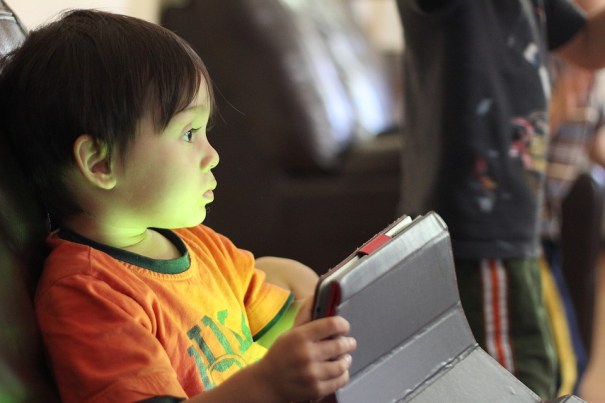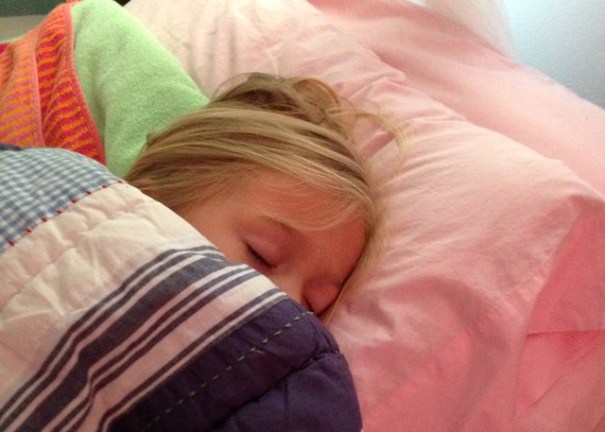Tips for Starting (& Keeping) a Successful Bedtime Routine
With the new school year starting, your family’s schedule is likely to be in flux the next few weeks, which means getting ready for bed is an even bigger deal. Establishing a consistent bedtime routine will help your kiddos start their days (and nights) off in the right direction. While kids are never thrilled about going to sleep, we have a few ideas (from experts and parents like you!) to make bedtime a fun routine and not a nightly battle.

1. Start bedtime 20 minutes to one hour earlier.
While there may be no standard bedtime for every kiddo, research suggests that going to bed early is the best strategy for all kids. One way to guarantee earlier bedtimes is allowing plenty of time for little ones to get ready for bed. For example, if you want your little angel to be asleep at 8 p.m., make sure she starts the bedtime routine 20 minutes to one hour before.

2. Power down and turn up.
Unplug all visual electronic devices at least one hour before bedtime (including parents’ devices). Not only is it distracting, but screen time before bed has been linked with less sleep and higher BMIs in kids. Make this special family time, and encourage kids to listen to music or play bedtime games. There's nothing like a dance party to get the last bit of wiggles out!

3. Read before bed.
Reading and bedtime stories are a great way to transition from a busy day to sleepy time. Let your kiddo choose a few books they want to read and make story time part of the bedtime routine. Another reason why reading before bed is great is it actually helps kids learn. The American Academy of Pediatrics recommends parents start reading to kids as early as birth to help them learn more words, which helps with brain development.

4. Sing lullabies.
Did you know signing to your little ones can actually give them more educational and emotional success as they grow? Sally Goddard-Blythe, director of the UK’s Institute for Neuro-Physiological Psychology, recommends that parents start working on their singing abilities and belting out those bedtime songs to ensure healthier kids.

5. Allow for wind-down time.
Just like adults, kids' brains can't go from being stimulated to suddenly sleeping. Jennifer Shu, MD, a pediatrician with Children's Medical Group in Atlanta, suggests you plan for some wind-down time before your little one hits the pillow. This is when kids can read a book or you can start dimming the lights in their bedroom. Keep things calm and on the low-key side (that means no tickle fights during the wind-down time).

6. Disarm fear of the dark
According to Mary Dobbins, MD, a pediatrician and child psychologist, it's normal for kids to be afraid of the dark. If your little one is scared of the nighttime darkness and potential monsters under the bed, make a fun game of quietly checking the room with a flashlight for any "monsters" in the closet or under the bed.

7. Keep fear of FOMO at bay.
Is your little one avoiding bedtime because he has a fear of missing out (FOMO)? This fear may not be darkness-based, but it's just as common. A helpful tip is to explain that when you leave the room, you’re going to start your own wind-down process and get ready for bed soon. If that elicits an eye roll, remind them of something they're looking forward to tomorrow like a visiting relative, a trip to the playground or a special outing. This gentle reminder will enforce that the sooner they go to sleep, the sooner tomorrow will come!

8. Get a snack (but keep it light).
Sometimes a small bite to eat before bedtime can actually help kids fall (and stay) asleep. In fact, when a little one (especially a toddler) has a full tummy, they are more likely to sleep through the night instead of waking up hungry. Alissa Palliano of Mommybites suggests simple snacks like yogurt and cheese (great for added calcium), whole grain, fruit or nut butter to keep tummies in line and kids ready for bed.

9. Offer choices to help bedtime go smoothly.
Many kids dislike bedtime because they feel they're not able to make decisions about going to bed. Instead of making bedtime an argument-filled zone, help kids maintain a sense of control by offering them different choices as part of their routine. Jennifer Waldburger, the co-founder of Sleepy Planet child sleep consultation firm, suggests the following: "Do you want to skip or walk to the bath?" Or "Do you want to wear green pajamas or blue ones?" Or ask them if they want two stories or three.

10. Maintain a relaxing ritual like a bath or massage.
Parents aren't the only ones who benefit from a relaxing massage. Studies show that kids also reap the rewards of this relaxing ritual. According to Maria Hernandez-Reif, a researcher at the Touch Research Institute, massage reduces stress hormone levels and blood glucose levels. These lower stress hormones help reduce anxiety and can give your kiddo a healthier immune system as she grows. A relaxing bath before bedtime is also a great way to transition to the relaxation of bedtime.

11. Use a security object.
One of the reasons little ones don't like bedtime is because it's a big part of the day that they're alone. To help them feel more at ease, make sure your kiddo has a security object that she selects and brings to bed with her. This could be a blanket, stuffed animal or even a shirt that has mom or dad's scent. Those little objects can help bring some safety to the bedtime routine.

12. Don't forget a potty stop.
Make sure your kiddo makes one last bathroom stop before bedtime. According to Vincent Iannelli, MD, this is especially important for kids who are prone to wetting the bed. Using the restroom before bed also helps kids avoid the tendency to get back out of bed to go to the bathroom once you've already said goodnight.

13. Don't budge.
Most kids who ask for one more bite of food or sip of water aren’t famished or parched, they’re simply stalling. Set boundaries and be diligent about enforcing them. Whenever appropriate, leave a glass of water bedside to ward off thirst. Getting back into the swing of things is tough for kids, but if you remain patient and firm, a peaceful bedtime routine will come together in no time.

14. Consistency is key.
Above all else, be consistent! To ensure the routine is consistent, do it at the same time and in the same order every night. And choose a bedtime a bit earlier than you might think. Studies show that earlier bedtimes promote health, good sleep hygiene, and cognitive skills.
—Leah Singer and Janelle Connor
Featured image: Pexels
RELATED STORIES:
Why Earlier Bedtimes Lead to Healthier and Possibly Smarter Children
Earlier Bedtimes for Kids is Better for Your Sanity, According to Study
This Is How to Tame Your Child’s Beastly Bedtime Routine
Here’s How Parents Around the World Tackle Bedtime

